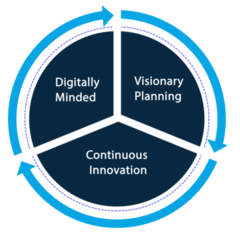|
Monday, March 06 2023
For the purposes of this article, Digital Transformation will be defined as the creative use of technology to solve traditional problems. Digital solutions enable new types of innovation and creativity, leading to the disruption of markets and the emergence of new market leadership. Every day, new business leaders emerge who have embraced the idea that they can be transformed into a better version of themselves. Sometimes, it is in the formation of a new company that disrupts a market. Other times, it is an established company that successfully pivots at the right time, with the right approach. In both cases, the leadership in those markets is fundamentally altered. Companies, and their leaders, are moved down, and sometimes out. Famous examples of this phenomenon include companies such as Kodak, Nokia, Blockbuster, Xerox, Yahoo, and countless others. Digital Transformation is a term that is tossed around a lot these days, and most leaders have at least thought about how their company might make changes. Many times, the impetus of this thought comes from a position of fear. The fear of being left behind, of being marginalized, of becoming irrelevant. Others see it as an opportunity to change into the type of company they always wanted to be. Whatever the motivation, most leaders conclude that thye should do something. Of course, if it were simple, everyone would be successful! But it’s not. While many have been successful in their efforts, countless others try and fail through various projects and initiatives. This is because of a misplaced perception of what Digital Transformation really is. Digital Transformation does not consist of a big project, or even a lot of little projects. Instead, real digital transformation begins with the presupposition that change must take place in order for the organization to be relevant in the future. Simply put, without change, there can be no transformation, To some [eople, the word transformation must sound and feel different from the word change. Most people don’t want change, but somehow, they think that they would like to transform. Unfortunately, transformation is impossible without substantial changes in the status quo. For the leaders who dare to embrace change, they need to focus their efforts in three distinct places, which are, perceptions, planning, and execution. Becoming Digitally MindedIn order to bring about real Digital Transformation, leaders of companies must begin their efforts by fostering a new way of thinking about information (data) they possess as well as the methods they use in relation to their products, services, performance, and especially their customers. We simply have access to so much more data than what was possible a few years ago, and customer’s expectations regarding communication and product personalization are radically different. So what does it mean to be Digitally Minded? Fundamentally, it means that people understand that they exist in a digital landscape that provides instant communication and unprecedented amounts of data. Data has the power to change how we perceive our performance by showing instant results. In the absence of data, it is easy for false impressions to persist, but when data shines it's light of truth on a situation, then it almost demands that we change our actions. On an individual level, the willingness to acknowledge that data should be used in decision making and planning is the beginning of becoming Digitally Minded. When this shift in thinking takes place, people anticipate data, and even alter their plans to capture even more data. The more difficult task is to change the collective mindsets across an entire organization. When group perceptions about their digital environment does not change, the old established practices persist forever, even in the midst of a new “Digital Transformation” project. The project is not enough. There must be a more fundamental shift toward becoming a digitally minded collection of people. New companies that often come on the scene don’t have to think about transforming because they already think and act digitally. They are natives to the digital world while the long-standing companies are the immigrants. As with all immigrants, some adapt quickly, while others fiercely hold onto their old ways.
As for leadership, the true visionaries of today think digitally. They are either native to the digital culture, or they have embraced it and made it their own. It is important to have senior leadership in full support of Digital Transformation. But creating an executive position of Chief Digital Officer, or something along these lines, does not necessarily lead to transformation. In fact, it may get in the way of creating systemic change in the organization. Companies that transform, do so together, or probably not at all. |

 Digital Transformation: Lead, Follow, or Get Out of the Way
Digital Transformation: Lead, Follow, or Get Out of the Way